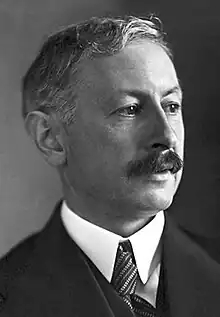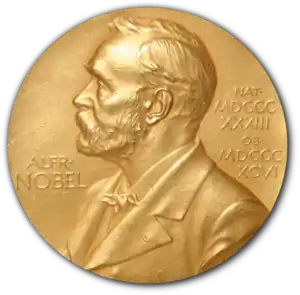Paul Karrer | |
|---|---|
 | |
| Born | 21 April 1889 |
| Died | 18 June 1971 (aged 82) |
| Nationality | Swiss |
| Alma mater | Universität Zürich |
| Known for | Vitamins |
| Awards | Marcel Benoist Prize (1922) Nobel Prize for Chemistry (1937) |
| Scientific career | |
| Fields | Chemistry |
| Institutions | Universität Zürich |
Professor Paul Karrer FRS FRSE FCS (21 April 1889 – 18 June 1971) was a Swiss organic chemist best known for his research on vitamins. He and Norman Haworth won the Nobel Prize for Chemistry in 1937.
Biography
Early years
Karrer was born in Moscow, Russia to Paul Karrer and Julie Lerch, both Swiss nationals. In 1892 Karrer's family returned to Switzerland where he was educated at Wildegg and at the grammar school in Lenzburg, Aarau, where he matriculated in 1908. He studied chemistry at the University of Zurich under Alfred Werner and after gaining his Ph.D. in 1911, he spent a further year as assistant in the Chemical Institute. He then took a post as chemist with Paul Ehrlich at the Georg Speyer Haus, Frankfurt-am-Main. In 1919 he became Professor of Chemistry and Director of the Chemical Institute.
Research
Karrer's early research concerned complex metal compounds but his most important work has concerned plant pigments, particularly the yellow carotenoids. He elucidated their chemical structure and showed that some of these substances are transformed in the body into vitamin A. His work led to the establishment of the correct constitutional formula for beta-carotene, the chief precursor of vitamin A; the first time that the structure of a vitamin or provitamin had been established. George Wald worked briefly in Karrer's lab while studying the role of vitamin A in the retina. Later, Karrer confirmed the structure of ascorbic acid (vitamin C) and extended his researches into the vitamin B2 and E. His important contributions to the chemistry of the flavins led to identification of lactoflavin as part of the complex originally thought to be vitamin B2.
Karrer published many papers, and received many honours and awards, including the Nobel Prize in 1937. His textbook Lehrbuch der Organischen Chemie (Textbook of Organic Chemistry) was published in 1927, went through thirteen editions, and was published in seven languages.
Personal life
Karrer was married to Helena Froelich in 1914 and had three sons, one of whom died in infancy.[1] He died on 18 June 1971, at the age of 82 in Zürich. His wife died in 1972.
Legacy
The prestigious Paul Karrer Gold Medal and lecture was established in his honour in 1959 by a group of leading companies such as CIBA AG, J.R. Geigy, F. Hoffmann-La Roche & Co. AG, Sandoz AG, Société des Produits Nestlé AG and Dr. A. Wander AG. It is awarded annually or biannually to an outstanding chemist who delivers a lecture at the University of Zurich.[2]
The Paul Karrer Lecture Foundation is based at the Chemistry Institute of the University of Zurich at Rämistrasse 71, in Zürich. [3]
References
- Sources
- Shampo; Kyle, RA (2000). "Paul Karrer—research on vitamins". Mayo Clinic Proceedings. 75 (4): 328. doi:10.4065/75.4.328. PMID 10761480.
- Isler (1978). "Paul Karrer, 21 April 1889—18 June 1971". Biographical Memoirs of Fellows of the Royal Society. 24: 245–321. doi:10.1098/rsbm.1978.0009. PMID 11615740. S2CID 7389730.
- Schmid (1972). "Paul Karrer, 1889–1971". Bulletin der Schweizerischen Akademie der Medizinischen Wissenschaften. 28 (5): 367–70. PMID 4566692.
- Roche (1972). "Paul Karrer (1889–1971)". Bulletin de l'Académie Nationale de Médecine. 156 (4): 89–92. PMID 4565808.
- Karrer; Viscontini, M; Hochreuter, R (1953). "Crystallized 3-carboxamide-N1-D-ribosidopyridinium bromide and related compounds". Biochimica et Biophysica Acta. 12 (1–2): 51–5. doi:10.1016/0006-3002(53)90122-x. PMID 13115412.
- Notes
- ↑ Isler, page 245
- ↑ "Paul Karrer Lecture". University of Zurich. Archived from the original on 20 January 2015. Retrieved 20 January 2015.
- ↑ "Paul Karrer Vorlesung". Institut für Chemie.
External links
- Paul Karrer on Nobelprize.org including the Nobel Lecture, 11 December 1937 Carotenoids, Flavins and Vitamin A and B2
